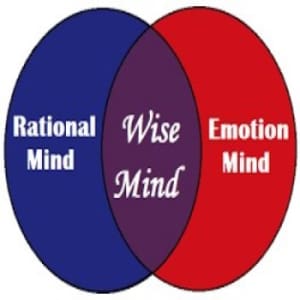
DBT Informed Treatment: Mindfulness and Interpersonal Effectiveness
$45.00
Dialectical Behavior Therapy is often used to treat Borderline Personality Disorder (BPD). Did you know that the core four DBT skills are also useful for clients who do not have BPD? This training will introduce learners to the philosophies and tenets of DBT and highlight two of the four core skills: mindfulness and interpersonal effectiveness. Clinicians will discover methods of integrating these two DBT-based skills with clients. Explore mindfulness and interpersonal skills such as wise mind, DEAR WOMAN, and FAST. Participants will have increased confidence and knowledge in implementing DBT-informed mindfulness and interpersonal effectiveness skills with a variety of clients.
Upon completion of the training, participants will be able to:
- Explain mindfulness and interpersonal effectiveness within the DBT model.
- Identify at least three mindfulness and interpersonal effectiveness skills to use with clients.
- Discover the value of integrating DBT-informed treatment with clients to improve their mindfulness and interpersonal effectiveness skills.
Social workers completing this course receive 3 Clinical asynchronous continuing education credits.
For other board approvals, this course qualifies for 3 hours of Clinical, Evidence-Based Practices, and General Skill Building continuing education training.
Course Instructor: Diane Bigler, LCSW, LSCSW
Recording Date: 4/27/2024
Recorded Live Webinar with downloadable presentation slides and/or handouts, evaluation, and a required quiz. The learner is required to pass with a 70% or higher to achieve the CE certificate of completion. The learner is able to reset the test until a satisfactory score is achieved. CE Training Workshops, LLC, provider #1770, is approved as an ACE provider to offer social work continuing education by the Association of Social Work Boards (ASWB) Approved Continuing Education (ACE) program. Regulatory boards are the final authority on courses accepted for continuing education credit. ACE provider approval period: 8/2/2022 – 8/2/2025. CE Training Workshops, LLC has been approved by NBCC as an Approved Continuing Education Provider, ACEP No. 7091. Programs that do not qualify for NBCC credit are clearly identified. CE Training Workshops, LLC is solely responsible for all aspects of the programs. System Requirements: Firefox, Chrome, Brave, Safari, Edge on any modern operating system (Windows, MacOS, Linux, Android, iOS). A desktop browser is recommended. We do not provide support resources for issues encountered using a mobile device. For more information about our policies and board approval statements, please visit our FAQS page.
Diane Bigler, LCSW, LSCSW is a Licensed Clinical Social Worker in Missouri and Kansas with over 25 years of experience in the mental health field.
DBT Informed Treatment: Mindfulness and Interpersonal Effectiveness (3 HR) Syllabus
I. Foundations of DBT
- Developed by Marsha Linehan to treat non-suicidal self-injury and BPD
- Integrates CBT, stoicism, humanism, Eastern philosophy, and dialectics
- Emphasizes validation, mindfulness, and behavior focus
- Applicable across a variety of client presentations beyond BPD
II. Understanding Mindfulness in DBT
- Defined as living with awareness in the present moment without judgment
- Helps clients accept reality and reduce judgment
- Promotes awareness of thoughts, emotions, physical sensations, and impulses
- Includes both complete awareness and intentional focus
III. Core Mindfulness Skills and Practices
- Observe: notice experiences in the moment
- Describe: label internal experiences without judgment
- Participate: engage fully in the here and now
- Wise Mind: integrate emotional and rational minds for balanced decision-making
- Practice includes sensory awareness, gratitude, and compassion statements
IV. Clinical Application and Case Example: Michael
- Case of a teen experiencing misophonia and distress intolerance
- Treatment focused on reducing avoidance and increasing distress tolerance
- Mindfulness techniques helped Michael regulate his emotional reactivity
- Outcome showed significant and lasting improvement in symptoms
V. Mindfulness and the Therapist
- Practice mindfulness to reduce burnout and increase presence
- Benefits include greater empathy, self-compassion, and therapeutic effectiveness
- Encourage integrating mindfulness into daily routines
VI. Introduction to Interpersonal Effectiveness (IE)
- Defined as the ability to interact effectively while balancing goals, relationships, and self-respect
- Skills support attending to relationships, asserting needs, and maintaining self-respect
- Key interaction goals: obtaining objectives, preserving relationships, and maintaining integrity
VII. Interpersonal Effectiveness Skills and Tools
- DEAR MAN: Describe, Express, Assert, Reinforce, Mindful, Appear confident, Negotiate
- GIVE: Gentle, Interested, Validate, Easy manner
- FAST: Fair, Apologies (limited), Stick to values, Truthful
- Use of relationship see-saw and prioritizing communication outcomes
VIII. Clinical Practice Examples and Case: Annie
- Annie, a dual diagnosis client with depression and substance use
- Treatment included behavior control, radical acceptance, and interpersonal skill building
- Emphasis on developing self-respect and distress tolerance
- Used mindfulness to reduce emotional reactivity in relationships
IX. Strategies for Implementation and Integration
- Use of handouts, visual aids, and worksheets to support skill use
- Reinforce skills through repetition, discussion, and application
- Leverage videos, self-assessments, and interactive tools for engagement


